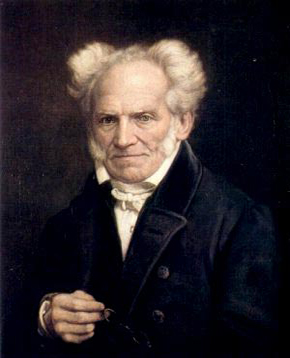
Arthur Schopenhauer

Arthur Schopenhauer's Views and Opinions on Human Will and Pessimism
Arthur Schopenhauer's philosophical outlook marked a distinctive turn from the prevailing Idealist trends of his time. Characterized by a certain pessimism, he proposed that the driving force behind the universe is not reason, but a blind, irrational will.
While he was influenced by the likes of Plato and Kant, Schopenhauer diverged significantly in his assertions about the nature of reality and the human condition.
His work, particularly "The World as Will and Representation," suggests that the phenomenal world is merely the visible manifestation of this deeper, often distressful will.
This foundation led him to a view where life's purpose revolved around minimizing suffering through detachment and aesthetic contemplation.
Schopenhauer's emphasis on will influenced not only subsequent philosophical thought but also the realms of psychology and the humanities, impacting notable figures in each field.
Summary
- Schopenhauer introduced an influential philosophical perspective that emphasizes an underlying will as the essence of existence.
- His views challenge the notion that the universe is driven by rationality, offering an alternative lens focused on intrinsic desire and struggle.
- Schopenhauer's legacy extends beyond philosophy to affect various disciplines, including literature, psychology, and arts.
Biographical Background
Arthur Schopenhauer's life journey is as intriguing as his philosophical works. His path from a young student to an influential philosopher is marked by personal loss, academic struggle, and eventual recognition.
Early Life and Education
Born on February 22, 1788, in Danzig, Prussia (now Gdańsk, Poland), Arthur Schopenhauer was the son of Heinrich Floris Schopenhauer, a successful merchant, and Johanna, a novelist.
He began his educational journey at private schools and, after the death of his father, he moved with his mother to Weimar.
Schopenhauer enrolled at the University of Göttingen in 1809, where he studied metaphysics and psychology, initially pursuing a degree in medicine before switching to philosophy.
Career and Major Works
In his early career, Schopenhauer faced difficulty in academia after graduating from the University of Berlin. He worked on his dissertation, The Fourfold Root of the Principle of Sufficient Reason, which laid the groundwork for his later philosophical essays.
Despite the significant contributions to philosophy his works would eventually make, Schopenhauer struggled to gain recognition during his lifetime, often overshadowed by his contemporaries.
Later Years and Death
Schopenhauer spent his final years in Frankfurt, where he wrote extensively and finally began to see the fruits of his labor, as his philosophy gained readership.
His writings on aesthetics, ethics, and psychology gained prominence posthumously. He succumbed to health complications arising from a cholera epidemic and passed away on September 21, 1860, leaving behind a rich legacy that would influence many future thinkers.
Philosophical Views
Arthur Schopenhauer's philosophy presents a detailed and nuanced picture of the world, tackling issues from the nature of reality to the role of art and morals. He engages with themes that question the optimism of human existence and offers a distinct perspective on how we understand and interact with the world.
The World as Will and Representation
Schopenhauer's magnum opus, The World as Will and Representation, reveals his belief that the world is driven by an irrational force he calls the 'Will'.
The 'Will' is an insatiable and blind process of striving, which Schopenhauer suggests is the underlying essence of everything.
In contrast, 'Representation' refers to the phenomena as experienced by individuals, dependent on the subjective perceptions and limitations of the human mind.
Metaphysics and Epistemology
In the realm of metaphysics and epistemology, Schopenhauer postulated the existence of a 'Thing-in-Itself', a reality beyond sensory experiences and scientific scrutiny.
He reconciled science and philosophy by arguing that while science offers explanations of phenomena, it cannot touch the underlying metaphysical truth that is dominated by the 'Will'.
For Schopenhauer, these areas of thought provide knowledge, but a knowledge that is always limited by human experience.
Art and Aesthetics
Art holds a special place in Schopenhauer's system as a means to temporarily escape the demands of the 'Will'.
He considered art, especially music, to be a universal language with the power to communicate the essence of the world directly.
Through authentic aesthetic experiences, individuals can briefly transcend the world of desire and suffering, encountering a realm of pure beauty and eternal ideas.
Ethics and Morality
Finally, Schopenhauer's views on ethics and morality are grounded in compassion and asceticism.
He viewed morality through the lens of actions that arise from empathy and the recognition of a shared 'Will' among all beings.
Asceticism, the denial of desires, serves as a response to the pain caused by the ceaseless striving of the 'Will'.
His perspective offers a way to ease suffering through ethical behavior and the rejection of material desires, culminating in an understanding of our place in nature and the value of human existence.
Key Influences and Legacy
Schopenhauer's philosophical stance was notably shaped by earlier thinkers, and his own ideas profoundly impacted subsequent philosophy and psychology. Here's an overview of these pivotal relationships.
Schopenhauer's Influences
Plato and Kant significantly shaped Schopenhauer’s philosophical thought.
He was inspired by Plato’s idea of transcendent realities that stand in contrast to the appearances we perceive.
Schopenhauer drew from Kant’s distinction between the phenomenon and the noumenon, extending Kant’s philosophy with his concept of the Will.
Furthermore, Buddhism influenced his endorsement of asceticism as a way to mitigate human suffering.
In the domain of literature, Goethe's work provided Schopenhauer with significant intellectual stimulation, contributing to his philosophical development.
Influence on Later Thinkers
Schopenhauer’s philosophy left an indelible mark on the works of Nietzsche, Freud, and Wittgenstein.
Dubbed the "Philosopher of Pessimism," his idea of the primacy of the 'Will' over 'Intellect' provided a stark counterpoint to his predecessors, which Nietzsche later integrated into his concept of the will to power.
Freud’s psychoanalytic theory was also impacted by Schopenhauer's notions of unconscious driving forces.
Many of Wittgenstein’s propositions echo themes found in Schopenhauer’s philosophical discourse, reflecting the persistent relevance of his work in modern intellectual thought.
Critiques and Controversies
Arthur Schopenhauer's philosophy often sparks intensive debate regarding his bleak view on life and controversial opinions on women and aesthetics. Critics have rigorously engaged with Schopenhauer's work, challenging both his philosophical conclusions and the implications stemming from them.
Criticism of Schopenhauer's Pessimism
Schopenhauer is widely known for his pessimistic philosophy, which asserts that life is filled with suffering and that happiness is an illusion.
Critics argue that this outlook is overly negative and fails to consider the capacity for human happiness and ethical progress.
His assertion that the will-to-live is the foundation of existence, leading to endless desires and subsequent suffering, has been countered by philosophers who believe in a more optimistic view of human purpose and potential.
Some critics, however, find value in Schopenhauer's candor about the harsh realities of life, seeing it as a necessary counterbalance to overly idealistic philosophies.
Responses to His Views on Women and Aesthetics
Schopenhauer's opinions on women have been especially controversial.
His claim that they are governed by “instinct” and lesser capability for rational thought has been met with accusations of misogyny and has tarnished his philosophical legacy for some.
Today, discussions on Schopenhauer's ethics often involve scrutiny of these gender views, as they bear significant implications for moral judgements.
In contrast, Schopenhauer's contributions to aesthetics garner a more mixed reception.
While he believed that art offers an escape from the suffering of life, allowing a temporary dissolution of the individual will, his detractors argue that this perspective is overly simplistic and negates the varied purposes art can serve in society.
Nevertheless, his reflections on aesthetics have also been influential, informing perspectives on the transcendent potential of art.
Concepts and Terminology
Schopenhauer's philosophy introduces key concepts that interlink his theories on the innate characteristics of the world and human existence. These terminologies serve as foundations for understanding his unique perspectives.
Will and Representation
The notion of the Will is central to Schopenhauer’s philosophical system, as he describes it as the underlying force of nature, driving all phenomena and life forms.
According to Schopenhauer, the Will is the thing-in-itself, which means it's the ultimate reality beyond the sensory world that we see and represent in our minds.
The Principle of Sufficient Reason
The Principle of Sufficient Reason is another cornerstone in Schopenhauer’s thought, which asserts that everything must have a reason or cause.
He even expands this principle into the Fourfold Root of the Principle of Sufficient Reason, which includes different types of explanations across various contexts, like logic, science, and human motivations.
Art and the Aesthetic Experience
For Schopenhauer, Art plays a profound role in offering escapes from the sufferings of life governed by Will.
Artistic and Aesthetic experiences allow individuals to transcend their individual will and unite with the eternal Will through a state of pure, will-less contemplation. In his analysis, this results in a deep appreciation and reflection on the essence of the world.
Influence on Psychology and Humanities
Arthur Schopenhauer's philosophy profoundly impacted the psychological and humanistic realms, shaping the ideas of subsequent thinkers in these fields.
Psychoanalytic Tradition
Schopenhauer's conception of the will influenced Sigmund Freud's development of psychoanalytic theory.
He introduced the notion that human behavior is not entirely controlled by rational thought but often driven by an irrational force, resonating with Freud's concept of the unconscious.
Schopenhauer's suggestion that the mind contains elements beyond conscious awareness laid the groundwork for Freud to explore the psychoanalytic mind's structure.
Literature and the Human Condition
The reach of Schopenhauer's philosophy extends deeply into French and English literature, where his pessimistic outlook and emphasis on the individual's internal struggles have inspired writers.
His ideas on the human condition's inherent conflicts resonate with literary exploration of characters grappling with existential problems.
The introspective nature of Schopenhauer's work provides a philosophical scaffold for authors to dissect the layers of consciousness and mind in fictional narratives.
Personal Beliefs and Lifestyle
Arthur Schopenhauer, a luminary in the world of philosophy, harbored views and led a lifestyle that reflected his deep engagement with asceticism and ethical questions. His beliefs were profoundly influenced by Eastern philosophies and were in sharp contrast to the prevailing Western thought of his time.
Views on Religion and Enlightenment
Schopenhauer's engagement with religion was complex.
He saw an enlightened perspective within certain religious frameworks, particularly those in line with ascetic principles.
His work suggests that he admired the moral strength found in asceticism, an idea strongly present in Buddhism.
While critical of some aspects of organized religion, Schopenhauer recognized the philosophical and ethical merits of religious teachings that emphasize the denial of worldly pleasures.
Schopenhauer's Personal Ethics
Schopenhauer's ethics centered on the inherent value of compassion and morality.
He posited that ethical conduct arises from the recognition of suffering within oneself and others.
He advocated for a compassionate treatment of all beings, which he saw as the highest manifestation of moralethics and an extension of his philosophical exploration into the nature of human will and motivation.
All articles


End of content
No more pages to load
